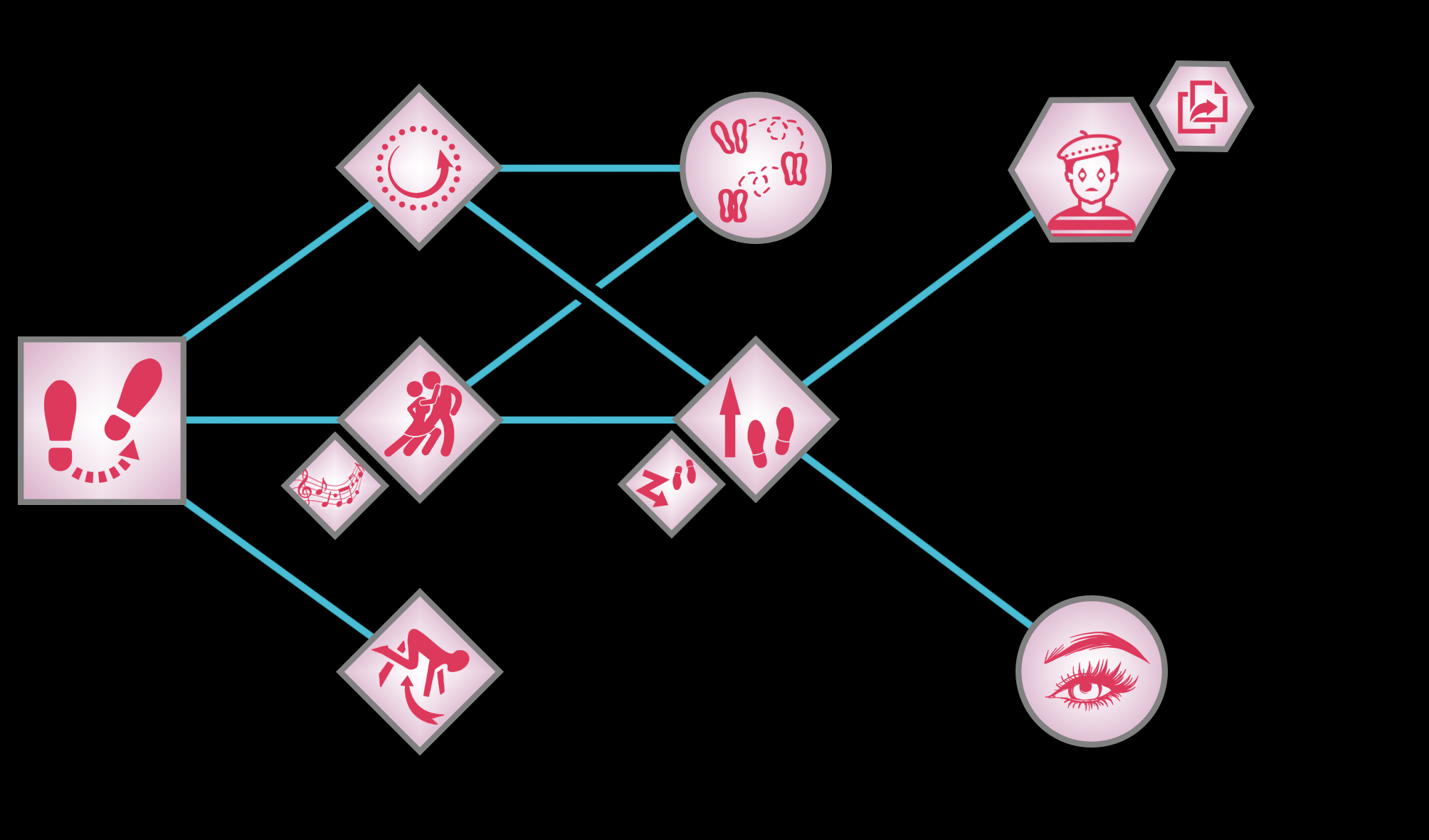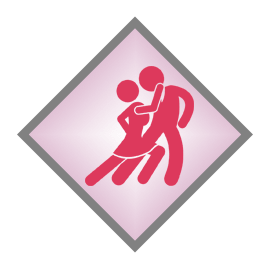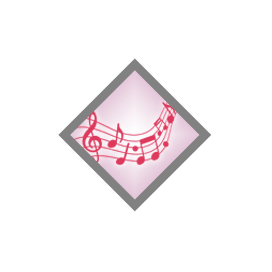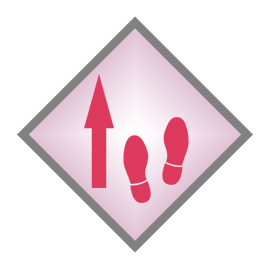
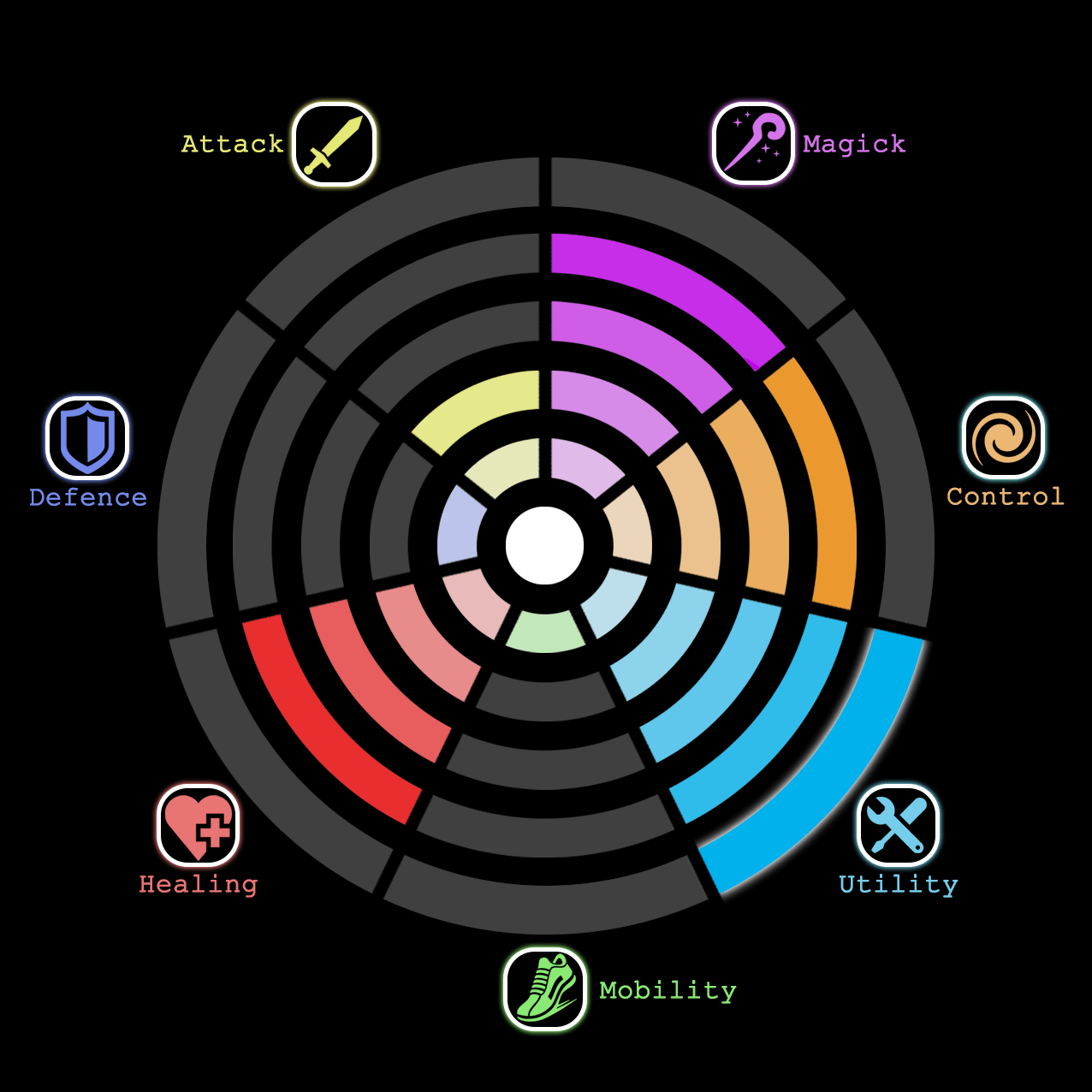
The word bard ordinarily puts folk in mind of those itinerant minstrels, fair of voice and nimble of finger, who earn their coin performing in taverns and the halls of great lords. Few know, however, that bards in fact trace their origins back to the swordsmen of eld, who sang in the heat of battle to fortify the spirits of their companions.
In time, their impassioned songs came to hold sway over the hearts of men, inspiring their comrades to great feats and granting peace unto those who lay upon the precipice of death.
Hit Points (HP)
| Hit Dice |
1d8 per level |
| HP at Level 1 |
8 + CON modifier |
| HP at higher levels |
1d8 (or 4) + CON modifier per level |
Proficiencies
| Armour |
Light armour |
| Weapons |
Simple weapons, hand crossbows, longswords, rapiers, shortswords, scimitars |
| Tools |
Three musical instruments of your choice |
| Saving Throws |
DEX, CHA |
| Skills |
Any three skills of your choice |
Bard Table
|
|
|
|
|
|
|
Spell slots per spell level |
| Level |
Proficiency Bonus |
Abilities |
Skills Known |
Bardic Dice |
Cantrips Known |
Spells Known |
1st |
2nd |
3rd |
4th |
5th |
6th |
7th |
8th |
9th |
| 1 |
+2 |
Spellcasting, Bardic Inspiration |
1 |
1d6 |
2 |
4 |
2 |
- |
- |
- |
- |
- |
- |
- |
- |
| 2 |
+2 |
Jack of All Trades |
2 |
1d6 |
2 |
5 |
3 |
- |
- |
- |
- |
- |
- |
- |
- |
| 3 |
+2 |
Expertise |
2 |
1d6 |
2 |
6 |
4 |
2 |
- |
- |
- |
- |
- |
- |
- |
| 4 |
+2 |
Ability Score Improvement |
3 |
1d6 |
3 |
7 |
4 |
3 |
- |
- |
- |
- |
- |
- |
- |
| 5 |
+3 |
Font of Inspiration |
3 |
1d8 |
3 |
8 |
4 |
3 |
2 |
- |
- |
- |
- |
- |
- |
| 6 |
+3 |
Countercharm |
4 |
1d8 |
3 |
9 |
4 |
3 |
3 |
- |
- |
- |
- |
- |
- |
| 7 |
+3 |
- |
4 |
1d8 |
3 |
10 |
4 |
3 |
3 |
1 |
- |
- |
- |
- |
- |
| 8 |
+3 |
Ability Score Improvement |
5 |
1d8 |
3 |
11 |
4 |
3 |
3 |
2 |
- |
- |
- |
- |
- |
| 9 |
+4 |
- |
5 |
1d8 |
3 |
12 |
4 |
3 |
3 |
3 |
1 |
- |
- |
- |
- |
| 10 |
+4 |
Magickal Secrets, Expertise (2) |
6 |
1d10 |
4 |
14 |
4 |
3 |
3 |
3 |
2 |
- |
- |
- |
- |
| 11 |
+4 |
- |
6 |
1d10 |
4 |
15 |
4 |
3 |
3 |
3 |
2 |
1 |
- |
- |
- |
| 12 |
+4 |
Ability Score Improvement |
7 |
1d10 |
4 |
15 |
4 |
3 |
3 |
3 |
2 |
1 |
- |
- |
- |
| 13 |
+5 |
- |
7 |
1d10 |
4 |
16 |
4 |
3 |
3 |
3 |
2 |
1 |
1 |
- |
- |
| 14 |
+5 |
Magickal Secrets (2) |
8 |
1d10 |
4 |
18 |
4 |
3 |
3 |
3 |
2 |
1 |
1 |
- |
- |
| 15 |
+5 |
- |
8 |
1d12 |
4 |
19 |
4 |
3 |
3 |
3 |
3 |
1 |
1 |
1 |
- |
| 16 |
+5 |
Ability Score Improvement |
9 |
1d12 |
4 |
19 |
4 |
3 |
3 |
3 |
3 |
1 |
1 |
1 |
- |
| 17 |
+6 |
- |
9 |
1d12 |
4 |
20 |
4 |
3 |
3 |
3 |
3 |
2 |
1 |
1 |
1 |
| 18 |
+6 |
Magickal Secrets (3) |
10 |
1d12 |
4 |
22 |
4 |
3 |
3 |
3 |
3 |
2 |
1 |
1 |
1 |
| 19 |
+6 |
Ability Score Improvement |
11 |
1d12 |
4 |
22 |
4 |
3 |
3 |
3 |
3 |
2 |
1 |
1 |
1 |
| 20 |
+6 |
Superior Inspiration |
12 |
2d8 |
4 |
22 |
4 |
3 |
3 |
3 |
3 |
2 |
2 |
1 |
1 |
Equipment
You start with the following equipment, in addition to the equipment granted by your background:
- (a) a rapier, (b) a longsword, or (c) any simple weapon
- (a) a diplomat's pack or (b) an entertainer's pack
- (a) a lute or (b) any other musical instrument
- Leather armour and a dagger
Or, you could choose to start with 5d4 × 10 gp and purchase your equipment.
Class Abilities
Bardic Inspiration
You can use a bonus action on your turn to choose one creature other than yourself within 20m of you who can hear you. That creature gains one Bardic Inspiration dice, a d6.
Once within the next 10 minutes, the creature can roll the dice and add the number rolled to one ability check, attack roll, or saving throw it makes. The creature can wait until after it rolls the d20 before deciding to use the Bardic Inspiration dice, but must decide before the DM says whether the roll succeeds or fails. Once the Bardic Inspiration dice is rolled, it is lost. A creature can have only one Bardic Inspiration dice at a time.
You can use this ability a number of times equal to your CHA modifier (a minimum of once). You regain any expended uses when you finish a long rest. Your Bardic Inspiration dice changes when you reach certain levels in this class. The die becomes a d8 at 5th level, a d10 at 10th level, and a d12 at 15th level.
Spellcasting
You have learned to untangle and reshape the fabric of reality in harmony with your wishes and music. Your spells are part of your vast repertoire – magick that you can tune to different situations.
Cantrips
You know two cantrips of your choice from the bard spell list. You learn additional bard cantrips of your choice at higher levels, learning a third cantrip at 4th level and a fourth at 10th level.
Spell Slots
The Bard table shows how many spell slots you have to cast your Spells of 1st level and higher. To cast one of these spells, you must expend a slot of the spell's level or higher. You regain all expended spell slots when you finish a long rest.
For example, if you know the 1st-level spell Curasa and have a 1st-level and a 2nd-level spell slot available, you can cast Curasa using either slot.
Spells Known of 1st Level and Higher
You know four 1st-level spells of your choice from the bard spell list. You learn an additional bard spell of your choice at each level except 12th, 16th, 19th, and 20th. Each of these spells must be of a level for which you have spell slots.
Additionally, when you gain a level in this class, you can choose one of the bard spells you know and replace it with another spell from the bard spell list, which also must be of a level for which you have spell slots.
Spellcasting Ability
Charisma is your spellcasting ability for your Bard spells, since the power of your magick relies the confidence of your performing ability. You use your CHA whenever a spell refers to your spellcasting ability. In addition, you use your CHA modifier when setting the saving throw DC for a Bard spell you cast and when making an attack roll with one.
Spell save DC = 8 + your proficiency bonus + your CHA modifier
Spell attack modifier = your proficiency bonus + your CHA modifier
Ritual Casting
You can cast a Bard spell as a ritual if that spell has the ritual tag.
Spellcasting Focus
You can use a musical instrument as a spellcasting focus for your Bard spells.
Jack of All Trades
Starting at 2nd level, you can add half your proficiency bonus, rounded down, to any ability check you make that doesn't already include your proficiency bonus.
Expertise
At 3rd level, choose two of your skill proficiencies. Your proficiency bonus is doubled for any ability check you make that uses either of the chosen proficiencies. At 10th level, you can choose another two skill proficiencies to gain this benefit.
Ability Score Improvement
At Levels 4, 8, 12, 16, and 19, you can increase one ability score of your choice by 2, or you can increase two ability scores of your choice by 1. As normal, you can't increase an ability score above 20 using this skill.
Font of Inspiration
Beginning when you reach 5th level, you regain all of your expended uses of Bardic Inspiration when you finish a short or long rest.
Countercharm
At 6th Level, you gain the ability to use musical notes or words of power to disrupt mind-influencing effects.
As an action, you can start a performance that lasts until the end of your next turn. During that time, you and any friendly creatures within 10m are immune to being
or
.
A creature already under these effects is not alleviated from them, however, they have Advantage on saving throws to remove them, and can make a saving throw to remove these effects when you use this ability. A creature must be able to hear you to gain this benefit.
The performance ends early if you are
or
or if you voluntarily end it (no action required). You can extend the duration of your performance as an action on your next turn.
Magickal Secrets
By 10th level, choose two spells from any class, including this one. A spell you choose must be of a level you can cast, as shown on the Bard table, or a cantrip. The chosen spells count as bard spells for you and are included in the number in the spells known column of the Bard table.
You learn two additional spells from any class at 14th level and again at 18th level.
Superior Inspiration
At 20th level, the first time you roll for initiative in combat and have no uses of Bardic Inspiration left, you regain one use. Further, your bardic inspiration dice is now considered to be 2d8.
 Blade & Flourish
Blade & Flourish
A flurry of steel, a flash of the blade. Bards that specialise in this skill tree become masters of fancy flourishes and maneuvers to hold their own in the heat of battle. While not as strong as other blademasters, their technique is impeccable, using it to take command of the battlefield.
Duelist. Upon reaching Level 5, if you have the most skill points spent in this skill tree, you gain proficiency in medium armour and shields, and whenever you perform the Attack action, you can make two weapon attacks instead of one. You gain the Weapon Mastery feature, allowing you to use the mastery properties of two kinds of weapons of your choice with which you have proficiency, such as Daggers and Shortswords, and you can change the kinds of weapons you chose whenever you finish a Long Rest. If you're proficient with a simple or martial melee weapon, you can use it as a spellcasting focus for your Bard spells. Also, you can pick a Fighting Style as written on the Knight class sheet from the following options:
- Blind Fighting
- Defense
- Duelling
- Great Weapon Fighting
- Two-weapon Fighting
Also, from 6th Level onwards, you are able to learn to take advantage of any drop in guard of your enemies. You can choose to forgo spending a skill point to learn the Attack of Opportunity* reaction below:
Reaction Trigger: A creature within your reach makes a ranged attack, leaves a square during its movement, or casts a spell with somatic (S) or material (M) components.
Effect: Make a melee weapon attack against the creature.
*Attack of Opportunity variant: You only get this feature if you are using this variant.
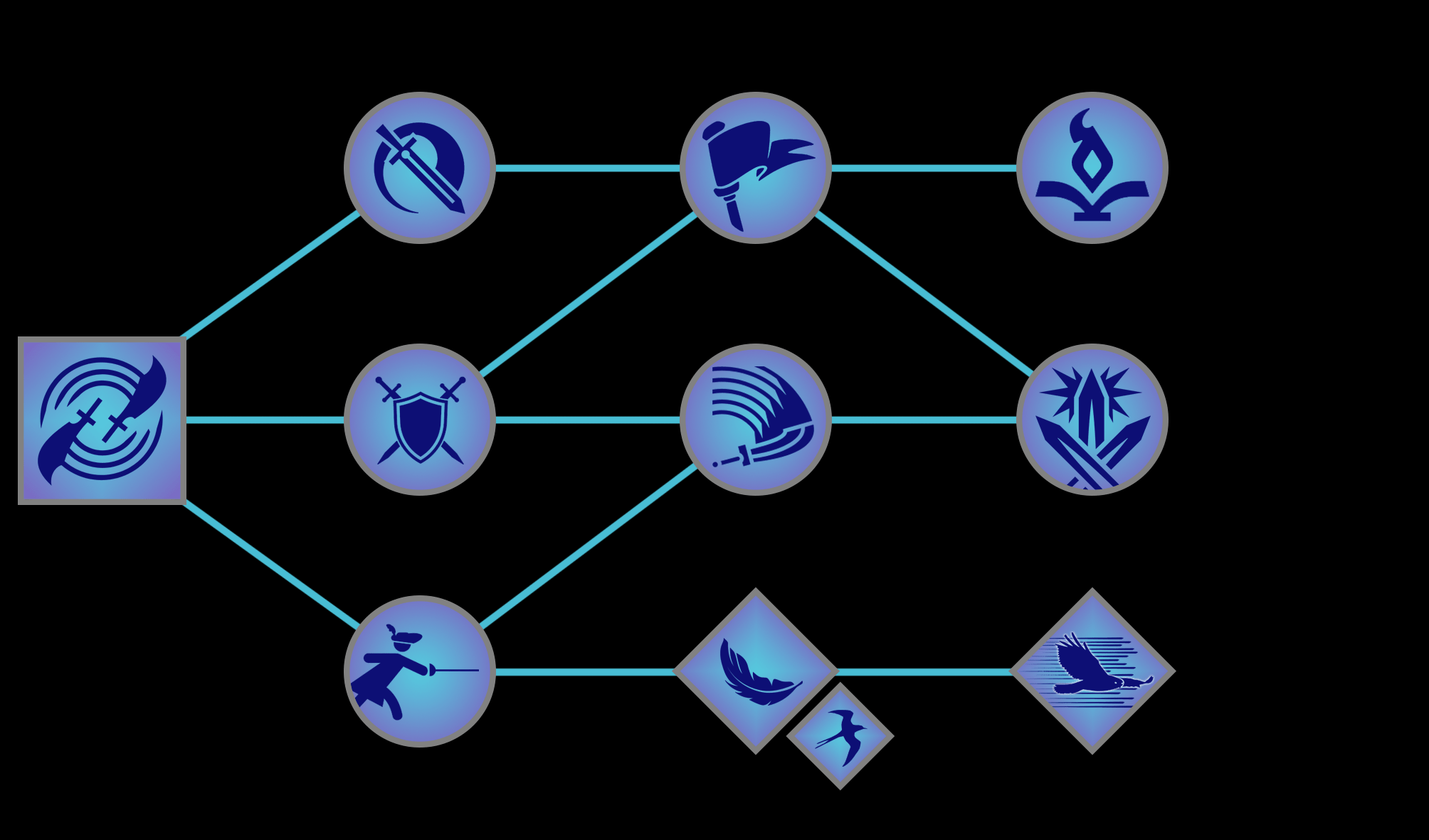
Blade Flourish
 |
PASSIVE
|
You have become nimble and light on your feet whenever you wield a blade.
Once per turn, whenever you take the Attack action while you are wielding a blade, use Featherblow or Nighthawk, or activate Battle Magick, your walking speed increases by 2m until the end of the turn.
If you have one Upgrade of this ability, the speed bonus increases by +2m. If you have three Upgrades of this ability, the speed bonus increases by another +2m.
|
Slashing Flourish
 |
UPGRADE
- Requires: Blade Flourish
|
You extend your flourish to slash through multiple foes nearby.
Whenever you hit with a weapon attack on your turn, you can activate this effect. You can expend one use of your Bardic Inspiration to cause all weapon attacks this turn to deal extra damage to the target you hit and to all other creatures of your choice that you can see within 2m of you. The damage equals the number you roll on the Bardic Inspiration dice.
This skill cannot be activated at the same time as Defensive Flourish or Mobile Flourish.
|
Defensive Flourish
 |
PASSIVE
- Requires: Blade Flourish
|
You extend your flourish to become defensive in nature.
Whenever you hit with a weapon attack on your turn, you can activate this effect. You can expend one use of your Bardic Inspiration to cause all weapon attacks this turn to deal extra damage to the target you hit. The damage equals the number you roll on the Bardic Inspiration dice. You also add the number rolled to your AC until the start of your next turn.
This skill cannot be activated at the same time as Slashing Flourish or Mobile Flourish.
|
Mobile Flourish
 |
PASSIVE
- Requires: Blade Flourish
|
You extend your flourish to push your foe and rapidly advance.
Whenever you hit with a weapon attack on your turn, you can activate this effect. You can expend one use of your Bardic Inspiration to cause the all weapon attacks this turn to deal extra damage to the target you hit. The damage equals the number you roll on the Bardic Inspiration dice.
You can also push the target up to 2m away from you, plus a number of metres equal to the one third of the number you roll on that dice (rounded up). You can then immediately move up to your walking speed to an unoccupied space within 2m of the target.
This skill cannot be activated at the same time as Defensive Flourish or Slashing Flourish.
|
Combat Inspiration
 |
PASSIVE
- Requires: Blade Flourish
- Requires: Level 4
|
Your inspiration towards your allies spurs them on toward better combat prowess.
A creature that has a Bardic Inspiration die from you can roll that die and add the number rolled to a weapon damage roll it just made. Alternatively, when an attack roll is made against the creature, it can use its reaction to roll the Bardic Inspiration die and add the number rolled to its AC against that attack, after seeing the roll but before knowing whether it hits or misses.
|
Featherblow

| Ability Time: 1 action
Range: Weapon range
AoE: Single
Duration: Instantaneous
- Requires: Blade Flourish
|
Strike with the grace of a feather on the wind.
You can only use this skill if you are wielding a blade.
Perform a weapon attack against a creature within your weapon range. You gain a bonus to this attack roll equal to 2 + your DEX modifier, however, you do not add your attack modifier to the damage roll of your weapon if you hit.
If you hit with the weapon attack, you afflict them with
,
and you gain the benefits as if you had taken the Disengage action.
|
Swallowtail
 |
UPGRADE
- Requires: Featherblow
- Requires: 3 points in Blade & Flourish
|
Your fancy maneuver turns into a graceful spin attack that cuts down surrounding units.
You instead now perform a weapon attack against any number of creatures within your weapon range, retaining the same bonus and penalty as the original skill.
Furthermore, if you hit with at least one of the weapon attacks, you now also gain the benefits as if you had taken the Dash action.
|
Battle Magick
 |
PASSIVE
- Requires: Combat Inspiration
- Requires: 3 points in Blade & Flourish
|
You are now able to swiftly strike someone after casting a spell.
When you use your action to a cast a Bard spell (including cantrips), you can make one weapon attack as a bonus action.
|
Master's Flourish
 |
PASSIVE
- Requires: Combat Inspiration
- Requires: 4 points in Blade & Flourish
- Requires: Level 10
|
All of your flourishing techniques have been refined by your masterful work.
Whenever you activate a Flourish skill that requires the use of a Bardic Inspiration dice, you can roll a d6 and use it instead of expending a Bardic Inspiration dice.
|
Nighthawk
 |
Ability Time: 1 action
Range: 20m
AoE: Single
Duration: Instantaneous
- Requires: Featherblow
- Requires: 3 points in Blade & Flourish
- Requires: Level 8
|
You shred the target with a manifestation of the talons of a deadly bird of prey, striking from afar.
You can only use this skill if you are wielding a blade.
Perform a number of melee weapon attacks, equal to the number you could make if you had performed the Attack action, against a creature within range. On hit, the target takes SLASH damage equal to 3d8 + your DEX modifier.
The critical hit chance of this ability is increased by 1.
You can use this ability a number of times equal to your DEX modifier, and this replenishes every short or long rest.
(If you use Slashing Flourish with Nighthawk, then you can choose to damage creatures within 2m of the target, instead of within 2m of yourself. If you use Mobile Flourish with Nighthawk, then you can immediately move up to your walking speed to any unoccupied space.)
|






 Song & Word
Song & Word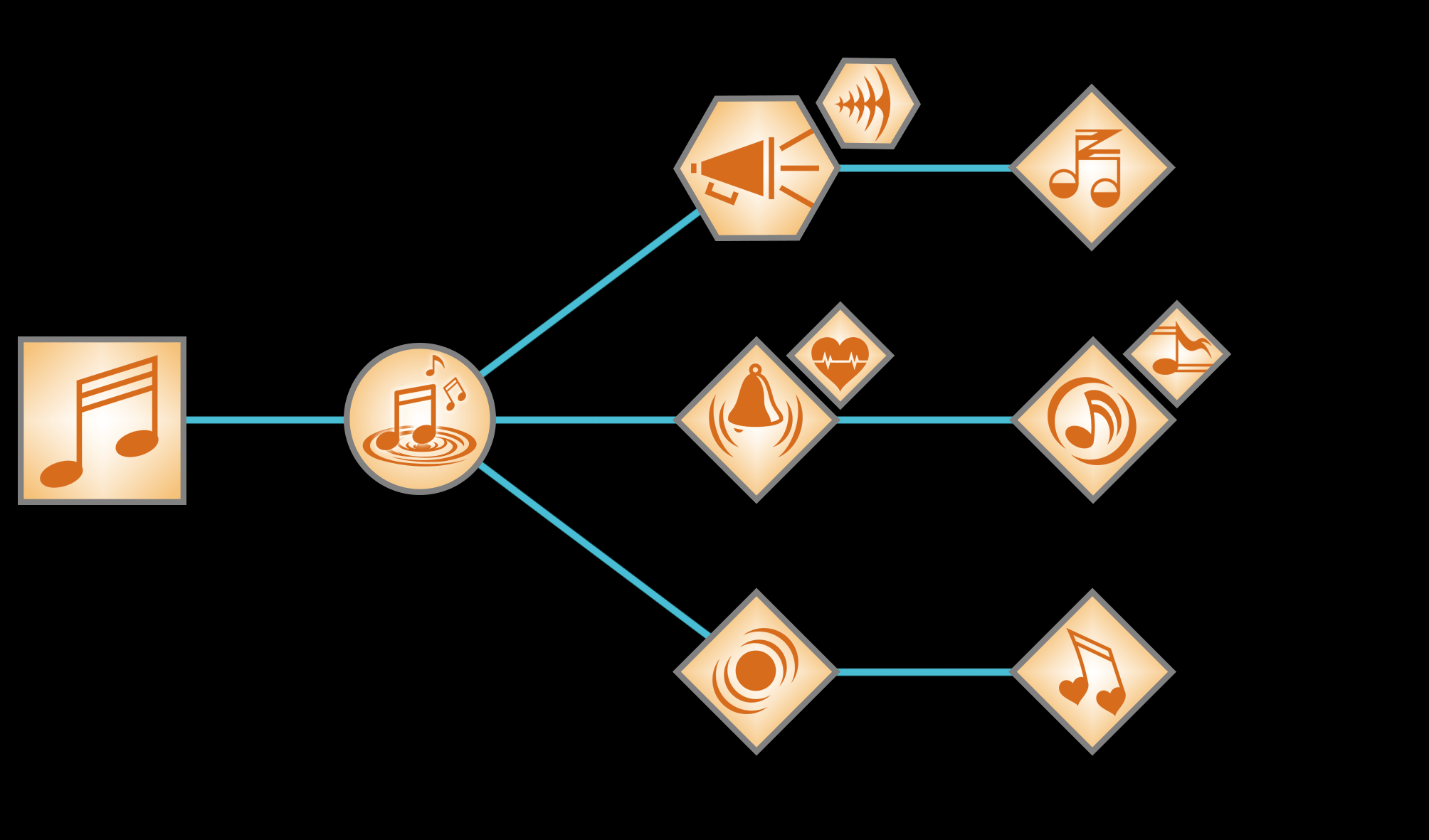



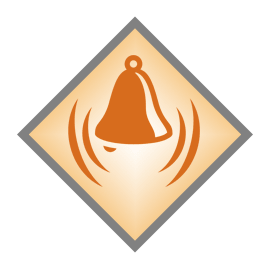



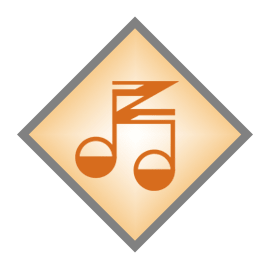

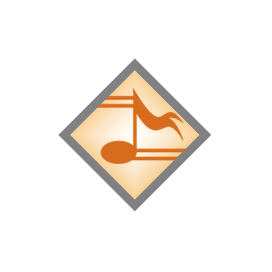

 Blade & Flourish
Blade & Flourish











 Step & Form
Step & Form